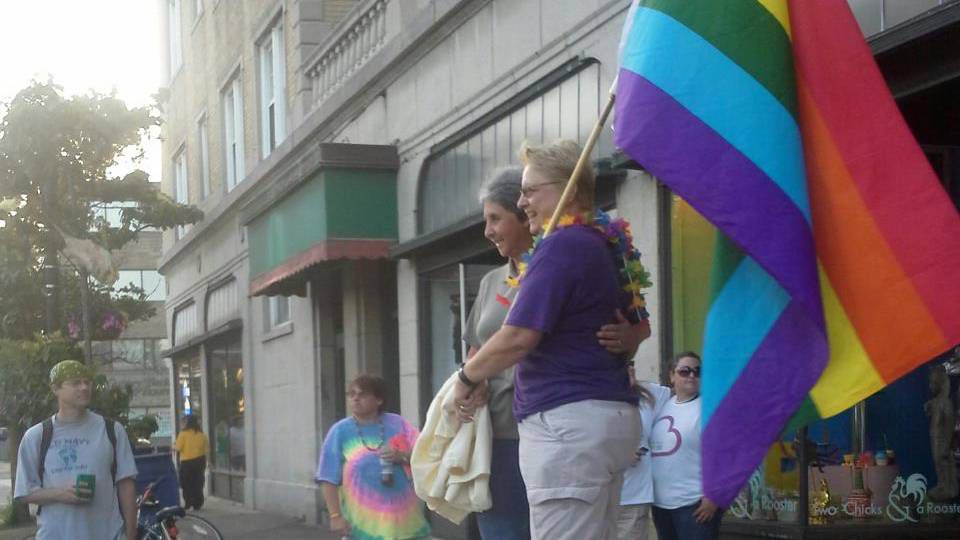Pride Month is over. Festive rainbow company logos have mostly disappeared from the internet, but for Buffalo’s LGBTQ community, the celebrations and struggles don’t go away when the calendar turns from June to July.
Pride Month embraces the community’s history and promotes acceptance, which is critical to LGBTQ people and their allies. That said, it’s also just as important to highlight the stories of Western New York’s diverse community year-round.
Lenore Pawlowski lives in Cheektowaga, and has lived through some very significant milestones in LGBTQ history with her long-time partner, and now wife, by her side. She said that she considers herself lucky to have had a supportive family back in the 1980s when being gay was not as accepted.
"At that time, my lady love and I weren’t living together yet, but we spent our weekends together," Pawlowski said. "When my mother and I were talking about buying a double [home] together, she mentioned that she would understand if I wanted my girlfriend to move in with me. I suppose that was when I finally realized that my mother knew what the relationship was between us, and that she was already accepted as a part of the family."
But, acceptance wasn’t always the case, especially when she was a young woman.
"A woman that I worked closely with, who knew [that I’m a lesbian], had asked her doctor if there was any risk of her getting AIDS because we shared the same bathroom," Pawlowski said she found this offensive, but tried to be understanding. Regardless, she explained that over time she grew to be more active in the fight for LGBTQ equality.
"A straight couple could meet in a bar, and get married two weeks later, and have more legal rights than my wife and I had after being together over 30 years," she added. "These weren't special rights; they were the rights that everyone else has always had."
Despite any challenges she faced, Pawlowski says that she’s seen progress over time, especially here in Western New York.
"I came to realize that a huge part of gaining acceptance among the straight community was to let them know that yes, they do know lots of gay people. We are your sisters, brothers, aunts, uncles, co-workers, friends, and we could all do our part by not hiding who we are," Pawlowski explained.
While there are so many challenges that come with being part of the LGBTQ community, it should also be noted that it can also be difficult for the families of LGBTQ folks. PFLAG is an organization has been working for nearly 50 years to support families and allies of the LGBTQ community around the country.
PFLAG started as an acronym for "Parents, Families, and Friends of Lesbians and Gays," but changed its official name to just PFLAG in 2014. There is a local chapter that Western New Yorkers can utilize for different types of support.
Julie Christiano is the president of PFLAG Buffalo/Niagara. She says that, up until the pandemic, the organization offered in-person support groups. Participants are able to share their story and get advice on ranging on topics that include how to accept a loved one who came out, and how to process a life change that, to some, may be challenging to accept or understand.
"We just let the person talk, it's non-judgmental," Christiano said. "If the person comes and says, 'I'm struggling with it, I don't understand this, my son was married, why did he leave his wife, why is he now with a man…,' we will throw out a lot of ideas and suggestions from experience. Several volunteers and board members include parents who have gone through similar situations where a loved one has come out to them.
Despite the coronavirus pandemic, she says that there are still support systems in place for Western New Yorkers. In person programs are suspended for July and August; however, there are several virtual options for anyone in need of guidance or conversation.
"Reach out to us, whether we've worked with you in the past or whether you're new, please reach out. We will help. We will make it work. The helpline [returns calls] within 24 to 48 hours, if a person calls, we'll call back," she said. Calls are kept confidential, and group meetings are treated as a safe space. The helpline for PFLAG is 716-883-0384.
PFLAG isn’t just for allies. If an LGBTQ person reaches out, the group will help in whatever way they can, even if it just means connecting them to other local resources. Christiano also said the group gives out two annual scholarships to local high school students who are dedicated to LGBTQ causes.
More information about support meetings, scholarships, and how to get involved with PFLAG can be found on its website.





